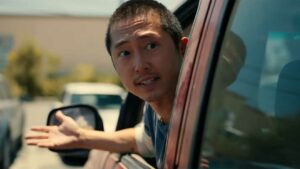
I’m really annoyed right now: ‘Beef’ and the uses of anger
Opinion + AnalysisRelationshipsSociety + Culture
BY Joseph Earp 15 MAY 2023
Beef, the acclaimed new Netflix show, starts with an incident of one of the most commonplace examples of extreme emotion in our society – road rage.
We’ve all been there. You’re having a bad day. Or, if you’re the two heroes of Beef, a bad life – Danny (Steven Yeun), is a frustrated contractor, has sailed from one disappointment to the next, while Amy (Ali Wong), has big dreams that she can’t quite seem to realise. In another life, these two might have joined forces to combat the stresses that seem ready to swallow them whole. Instead, Danny almost runs into Amy in a brutalist parking lot.
Rather than either of them letting this go, the pair escalate their titular beef. They swear at one another. They make threatening motions with their cars. And then, before they know it, they’re all-out-furious, embroiled in a comically overblown chase sequence on the highway.
And it doesn’t end there, either. After this one act of aggression, Danny and Amy become locked in a series of escalating vengeful manoeuvres, from pissing on each other’s bathroom floors to all-out violence. It’s one incident of rage that ruins both of their lives. And, most troubling of all, Danny and Amy seem to love their fury. They embrace it totally, even as houses burn to the ground around them.

The consequences of anger
Clearly, Beef tells us that anger has the ability to escalate – that it’s an emotional state that can start minor, and then, if we don’t do anything about it, has the power to totally consume us. As Jennifer S. Lerner and Larissa Z. Tiedens note in their paper Portrait of the Angry Decision Maker, anger has “uniquely captivating properties” – if we’re not careful, it’ll make us one-track minded.
It’s partially for this reason that anger is often viewed as a “negative” emotion, one we would do better without. As philosophers Paul Litvak, Jennifer Lerner, and Larissa Z. Tiedens point out in their paper Fuel In The Fire, “anger makes people indiscriminately punitive, indiscriminately optimistic about their own chances of success, careless in their thought, and eager to take action.”
The angry person is not typically viewed as the one in the best place to make judgements. The angry person can act, as Danny and Amy do, irrationally, frequently moving against their own best interests. How many people have we all met whose rage has made them ruin a relationship that they value, or get themselves in trouble at work?

Much therapeutic practice is designed to eradicate negative emotions. Psychological practices like DBT (Dialectical Behaviour Therapy) encourage patients to rid themselves of anger, so that they might think clearly. This follows a version of the model of emotions favoured by the stoics. Marcus Aurelius, a Roman emperor and key proponent of the Stoic model, once wrote, “A real man doesn’t give way to anger and discontent, and such a person has strength, courage, and endurance—unlike the angry and complaining.”
On this model of emotional regulation, the right thing to do is take anger as a kind of emotional data, process it, wait for it to pass, and then act. Not out of anger. Deciding what to do only when calm.
What anger does
We might be quick to assume, like the Stoics, that anger is something to always be avoided. But in doing so, we ignore the way anger gets things done. Consider the anger at the heart of key civil rights movements from across the years. “If you’re not angry, you’re not paying attention,” has been a rallying cry used for everything from the fight for feminist rights, to the struggle against racism. There are clearly injustices that we are right to feel angry about.
In fact, dismissing someone’s concerns because they are angry has sometimes been used to try and deflate moves towards equality. Suffragettes, for instance, were often painted by the press as “hysterical” and out of control, their righteous fury seen as cause to eradicate their movements.
Moreover, anger has uniquely focusing effects. We see this in Beef. Before they almost crash into each other, Danny and Amy are aimless, buffeted around by forces bigger than them. The fury that they feel at one another focuses them. It is something that they control; something within their power. It inspires action from people whose lives have been marked by inaction.
So where is the point of balance between these two perspectives? Can we feel anger, and allow it to focus us, without allowing it to destroy our life, and make us bad decision makers?
The philosopher Martha Nussbaum believes so. Nussbaum is well-known for her rehabilitation of stoic philosophy – much of her philosophical work has been about bringing that ancient movement back into the light.
In her book Anger and Forgiveness, she embraces key features of the stoic opinion on anger. She calls anger a “trap”, and notes that she does not believe that anger “is morally right and justified.” For her, anger has all the negative qualities described above – it often leads to actions designed as “payback”, retaliative gestures that are seen to “assuage the pain or make good the damage.” She does not believe anger does this. She thinks it merely adds more hurt to a pile of hurt, hurting the aggressor as much as the victim they lash out at.
But Nussbaum does not dismiss anger out of hand. This makes her different to many stoics. She thinks anger is to be eradicated, but creates a related category to that feeling called “transition-anger.” This is not simply anger. It is not the desire to punish. It is not defined by wallowing in negative emotions. Instead, she describes the “entire cognitive content” of “transition-anger” as being made up of the thought, “How outrageous. That should not happen again.”
Transition-anger doesn’t make us merely lash out at those who have hurt us. Instead, it directs us towards positive forward action. We use it to focus ourselves. But that focus drives us towards good moral behaviour. It turns unmoved citizens into powerful figures of protest. It creates community, people united in their desire to make the world a better place.
Amy and Danny aren’t bad moral actors merely because they’re angry, then. They’re bad moral actors because they do the wrong things with their anger. It’s not that they should never have felt rage. It’s that they allowed that rage to make them ugly and cruel, when it should have made them kinder.
Ethics in your inbox.
Get the latest inspiration, intelligence, events & more.
By signing up you agree to our privacy policy
You might be interested in…
Explainer
Relationships
Ethics Explainer: Moral Relativism
Opinion + Analysis
Business + Leadership, Society + Culture
The Ethics Centre: A look back on the highlights of 2018
Opinion + Analysis
Relationships
Ethics Explainer: The principle of charity
Opinion + Analysis
Science + Technology, Society + Culture



